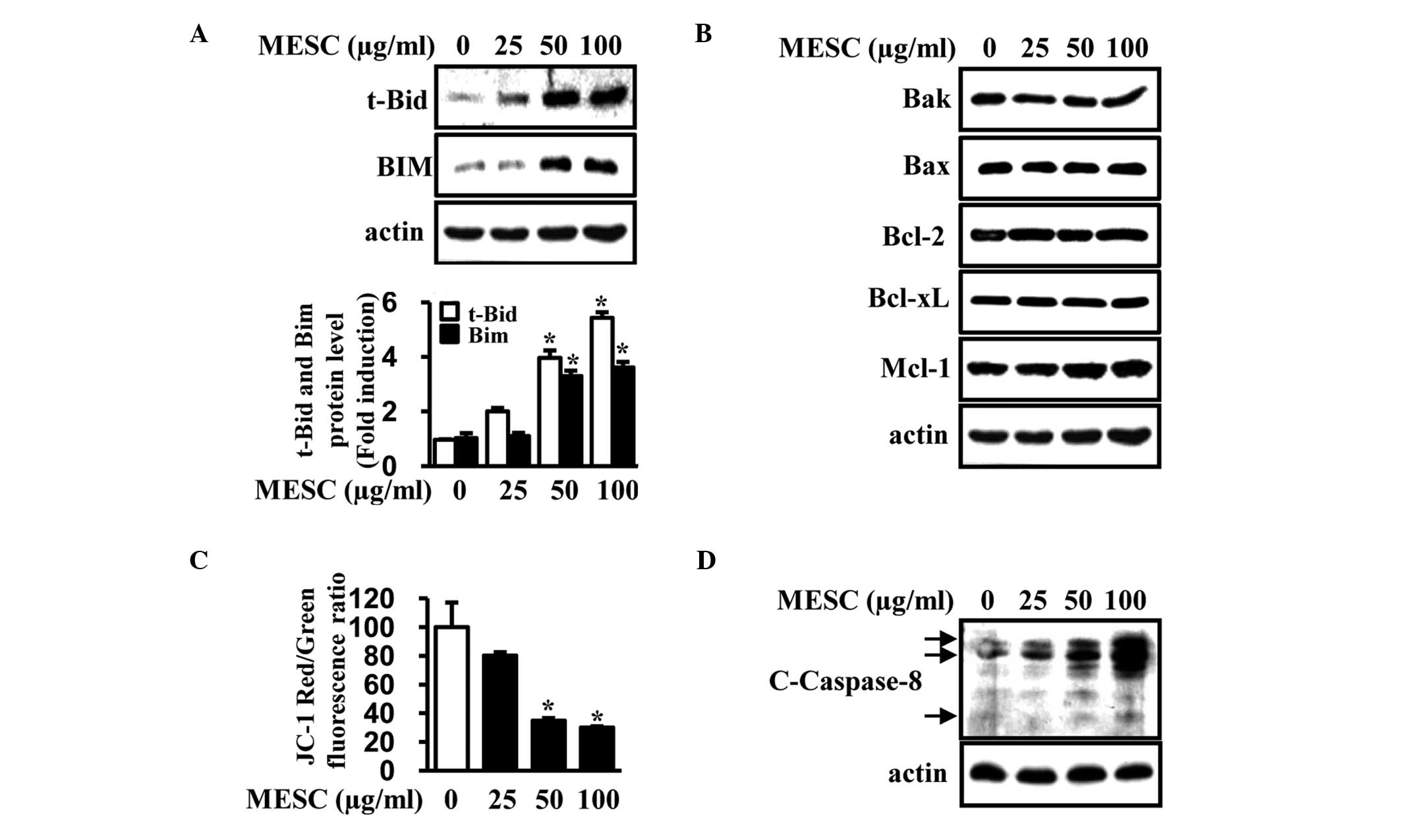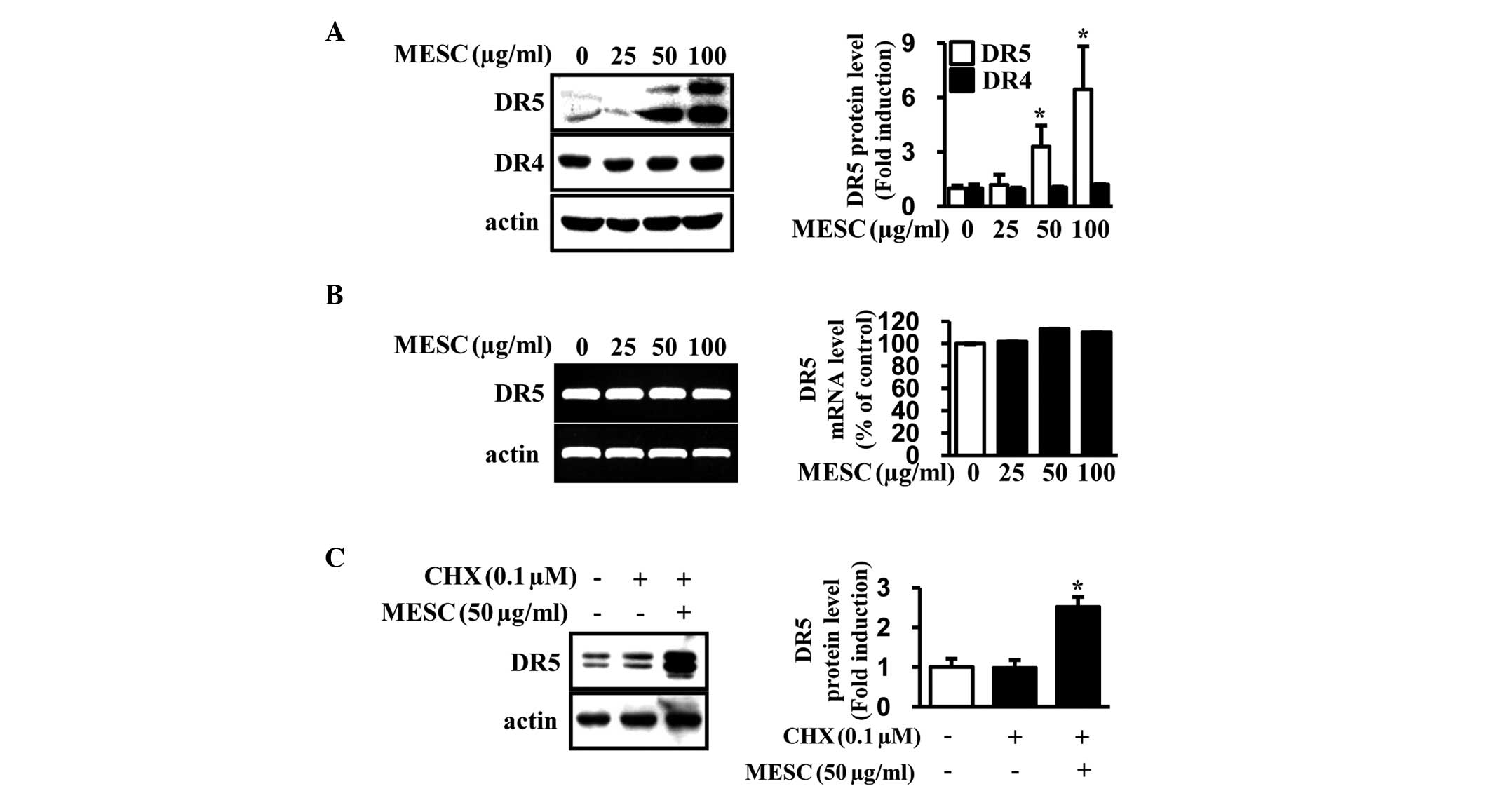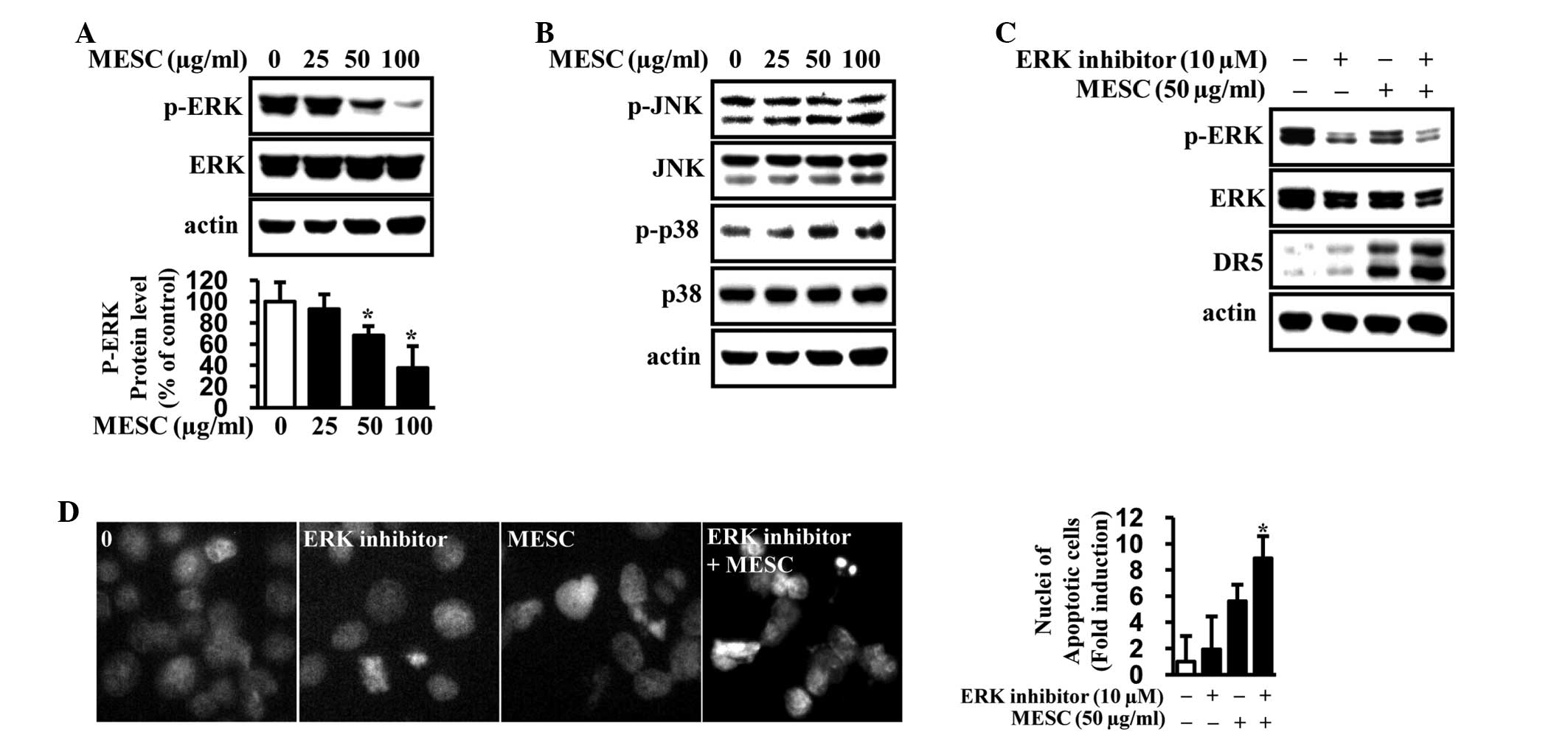|
1
|
Ferlay J, Shin HR, Bray F, Forman D,
Mathers C and Parkin DM: Estimates of worldwide burden of cancer in
2008: GLOBOCAN 2008. Int J Cancer. 127:2893–2917. 2010. View Article : Google Scholar : PubMed/NCBI
|
|
2
|
Johnson NW, Warnakulasuriya S, Gupta PC,
et al: Global oral health inequalities in incidence and outcomes
for oral cancer: causes and solutions. Adv Dent Res. 23:237–246.
2011. View Article : Google Scholar : PubMed/NCBI
|
|
3
|
Frankenthaler RA, el-Naggar AK, Ordonez
NG, Miller TS and Batsakis JG: High correlation with survival of
proliferating cell nuclear antigen expression in mucoepidermoid
carcinoma of the parotid gland. Otolaryngol Head Neck Surg.
111:460–466. 1994.PubMed/NCBI
|
|
4
|
Hicks MJ, el-Naggar AK, Byers RM, Flaitz
CM, Luna MA and Batsakis JG: Prognostic factors in mucoepidermoid
carcinomas of major salivary glands: a clinicopathologic and flow
cytometric study. Eur J Cancer B Oral Oncol. 30B:329–334. 1994.
View Article : Google Scholar : PubMed/NCBI
|
|
5
|
Press MF, Pike MC, Hung G, et al:
Amplification and overexpression of HER-2/neu in carcinomas of the
salivary gland: correlation with poor prognosis. Cancer Res.
54:5675–5682. 1994.PubMed/NCBI
|
|
6
|
Handra-Luca A, Ruhin B, Lesty C and Fouret
P: P27, SKP2, and extra-cellular signal-related kinase signalling
in human salivary gland mucoepidermoid carcinoma. Oral Oncol.
42:1005–1010. 2006. View Article : Google Scholar : PubMed/NCBI
|
|
7
|
Abelson PH: Medicine from plants. Science.
247:5131990. View Article : Google Scholar : PubMed/NCBI
|
|
8
|
Efferth T, Kahl S, Paulus K, et al:
Phytochemistry and pharmacogenomics of natural products derived
from traditional Chinese medicine and Chinese materia medica with
activity against tumor cells. Mol Cancer Ther. 7:152–161. 2008.
View Article : Google Scholar : PubMed/NCBI
|
|
9
|
Khan I, Nisar M, Ebad F, et al:
Anti-inflammatory activities of Sieboldogenin from Smilax
china Linn: experimental and computational studies. J
Ethnopharmacol. 121:175–177. 2009. View Article : Google Scholar : PubMed/NCBI
|
|
10
|
Shu XS, Gao ZH and Yang XL:
Anti-inflammatory and anti-nociceptive activities of Smilax
china L. aqueous extract. J Ethnopharmacol. 103:327–332. 2006.
View Article : Google Scholar
|
|
11
|
Xu W, Liu J, Li C, Wu HZ and Liu YW:
Kaempferol-7-O-beta-D-glucoside (KG) isolated from Smilax
china L. rhizome induces G2/M phase arrest and apoptosis on
HeLa cells in a p53-independent manner. Cancer Lett. 264:229–240.
2008.PubMed/NCBI
|
|
12
|
Li YL, Gan GP, Zhang HZ, et al: A
flavonoid glycoside isolated from Smilax china L. rhizome in
vitro anticancer effects on human cancer cell lines. J
Ethnopharmacol. 113:115–124. 2007.
|
|
13
|
Wu LS, Wang XJ, Wang H, Yang HW, Jia AQ
and Ding Q: Cytotoxic polyphenols against breast tumor cell in
Smilax china L. J Ethnopharmacol. 130:460–464. 2010.
View Article : Google Scholar : PubMed/NCBI
|
|
14
|
Samanta AK, Huang HJ, Bast RC Jr and Liao
WS: Overexpression of MEKK3 confers resistance to apoptosis through
activation of NFkappaB. J Biol Chem. 279:7576–7583. 2004.
View Article : Google Scholar : PubMed/NCBI
|
|
15
|
Balmanno K and Cook SJ: Tumour cell
survival signalling by the ERK1/2 pathway. Cell Death Differ.
16:368–377. 2009. View Article : Google Scholar : PubMed/NCBI
|
|
16
|
Li H, Zhu H, Xu CJ and Yuan J: Cleavage of
BID by caspase 8 mediates the mitochondrial damage in the Fas
pathway of apoptosis. Cell. 94:491–501. 1998. View Article : Google Scholar : PubMed/NCBI
|
|
17
|
Kim R, Emi M, Tanabe K, Uchida Y and
Arihiro K: The role of apoptotic or nonapoptotic cell death in
determining cellular response to anticancer treatment. Eur J Surg
Oncol. 32:269–277. 2006. View Article : Google Scholar : PubMed/NCBI
|
|
18
|
Gross A, McDonnell JM and Korsmeyer SJ:
BCL-2 family members and the mitochondria in apoptosis. Genes Dev.
13:1899–1911. 1999. View Article : Google Scholar : PubMed/NCBI
|
|
19
|
Crompton M: Bax, Bid and the
permeabilization of the mitochondrial outer membrane in apoptosis.
Curr Opin Cell Biol. 12:414–419. 2000. View Article : Google Scholar : PubMed/NCBI
|
|
20
|
Fischer U and Schulze-Osthoff K: New
approaches and therapeutics targeting apoptosis in disease.
Pharmacol Rev. 57:187–215. 2005. View Article : Google Scholar : PubMed/NCBI
|
|
21
|
Kok SH, Yeh CC, Chen ML and Kuo MY:
Esculetin enhances TRAIL-induced apoptosis through DR5 upregulation
in human oral cancer SAS cells. Oral Oncol. 45:1067–1072. 2009.
View Article : Google Scholar : PubMed/NCBI
|
|
22
|
Kim JY, Kim EH, Kim SU, Kwon TK and Choi
KS: Capsaicin sensitizes malignant glioma cells to TRAIL-mediated
apoptosis via DR5 upregulation and survivin downregulation.
Carcinogenesis. 31:367–375. 2010. View Article : Google Scholar : PubMed/NCBI
|
|
23
|
Yadav VR, Prasad S, Kannappan R, et al:
Cyclodextrin-complexed curcumin exhibits anti-inflammatory and
antiproliferative activities superior to those of curcumin through
higher cellular uptake. Biochem Pharmacol. 80:1021–1032. 2010.
View Article : Google Scholar
|
|
24
|
Chang L and Karin M: Mammalian MAP kinase
signalling cascades. Nature. 410:37–40. 2001. View Article : Google Scholar : PubMed/NCBI
|
|
25
|
Chang F, Steelman LS, Shelton JG, et al:
Regulation of cell cycle progression and apoptosis by the
Ras/Raf/MEK/ERK pathway (Review). Int J Oncol. 22:469–480.
2003.PubMed/NCBI
|
|
26
|
Agell N, Bachs O, Rocamora N and
Villalonga P: Modulation of the Ras/Raf/MEK/ERK pathway by Ca(2+),
and calmodulin. Cell Signal. 14:649–654. 2002.
|
|
27
|
Huong LD, Shin JA, Choi ES, et al:
β-Phenethyl isothiocyanate induces death receptor 5 to induce
apoptosis in human oral cancer cells via p38. Oral Dis. 18:513–519.
2012.
|
|
28
|
Huong le D, Shim JH, Choi KH, et al:
Effect of β-phenylethyl isothiocyanate from cruciferous vegetables
on growth inhibition and apoptosis of cervical cancer cells through
the induction of death receptors 4 and 5. J Agric Food Chem.
59:8124–8131. 2011.
|
|
29
|
Sung B, Ravindran J, Prasad S, Pandey MK
and Aggarwal BB: Gossypol induces death receptor-5 through
activation of the ROS-ERK-CHOP pathway and sensitizes colon cancer
cells to TRAIL. J Biol Chem. 285:35418–35427. 2010. View Article : Google Scholar : PubMed/NCBI
|
|
30
|
Belyanskaya LL, Ziogas A,
Hopkins-Donaldson S, et al: TRAIL-induced survival and
proliferation of SCLC cells is mediated by ERK and dependent on
TRAIL-R2/DR5 expression in the absence of caspase-8. Lung Cancer.
60:355–365. 2008. View Article : Google Scholar : PubMed/NCBI
|


















